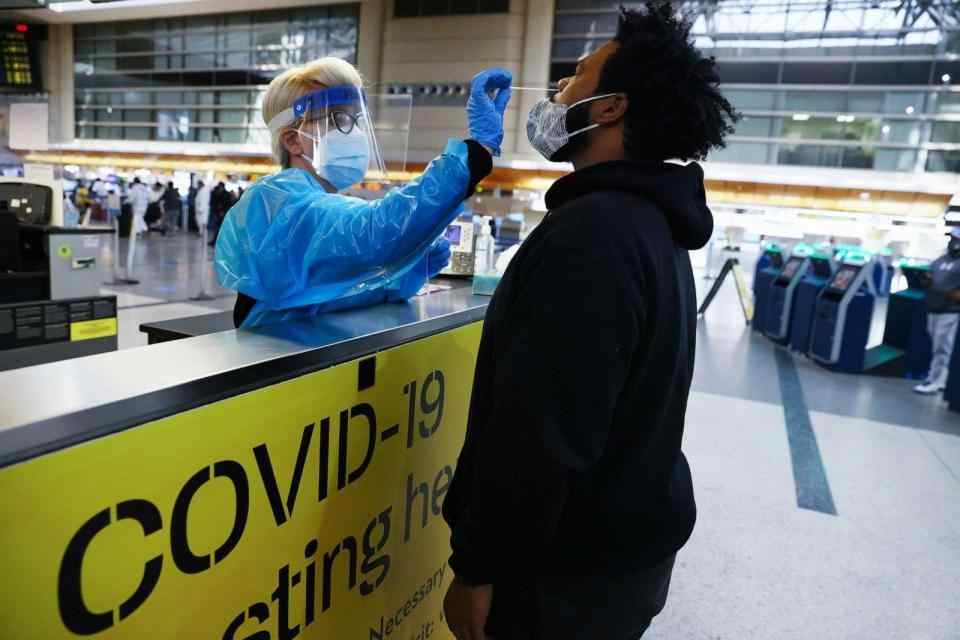Why tracking COVID reinfections has waned even as more people became sick

Millions of COVID-19 reinfections have been reported across the country yet just 11 states confirmed they are actively tracking them, according to an ABC News analysis. At least 18 states used to track infections but stopped once the public health emergency ended in May 2023.
Public health experts said tracking reinfections is important for understanding long-term complications and immunity from vaccination. Resources at health departments, however, are now being diverted to other areas that are in need. It comes even as COVID-19 hospitalizations tick up across the U.S., though experts say it's no reason for concern yet.
"It takes an enormous amount of resources not only to track COVID in its own right but also to track those reinfections," Dr. Richard Martinello, a professor of internal
More than 2.4 million COVID reinfections
Reinfection is defined by the Centers for Disease Control and Prevention as someone becoming infected with COVID-19, recovering and then getting infected again, typically 90 days after the first bout.
ABC News contacted health departments in all 50 states. Many did not have the data readily available and at least 10 states said they never tracked reinfections during the COVID-19 pandemic.
Of the 17 states that did provide tallies, at least 2.47 million people have tested positive more than once for COVID-19.
California and New York each recorded more than 600,000 reinfections, while North Carolina and Pennsylvania each recorded more than 200,000 reinfections.
"What was our hope, maybe in 2020, was that immunity for one episode of COVID would be lasting and durable and reinfection would be so much more unlikely but that's not proven true, sadly," said Dr. Cameron Wolfe, a professor of medicine in the division of infectious diseases at Duke University School of Medicine. "So, as many folks would know, you can get reinfected multiple times."
Experts said reinfections became even more common with the advent of the omicron variant, which was responsible for the winter wave of 2021-22, and its subsequent offshoots.
Typically, reinfections are mild but in certain populations they can be more severe, according to the CDC.
Why many states stopped tracking reinfections
Many state health departments told ABC News they stopped tracking COVID-19 reinfections either before or right as President Joe Biden ended the public health emergency in May 2023.
The end of the public health emergency meant doctors and labs were no longer required to report COVID-19 cases to state health departments. And with more people using rapid at-home tests to monitor illness -- with results not required to be reported to officials -- reinfections became harder to track.
"You can sort of almost think about it very similarly to flu," Wolfe said. "We don't concern ourselves with the accuracy of counting every single case of influenza or reinfection."
Experts said it's also labor-intensive and requires a lot of manpower to count and keep track of reinfection data.
Additionally, the stoppage of reinfection counting could be due to pandemic fatigue and a desire to return to normal or at least a sense of normalcy.
"There's been a real desire by everyone to return to a state of normal and so as long as we are heavily tracking and reporting COVID numbers, things are not feeling normal," Dr. Ashley Drews, Houston Methodist medical director of infection prevention and control, told ABC News.
Benefit to tracking reinfections
Reinfections are not being tracked as diligently but experts say there are benefits to doing so, even as we move into a new phase of learning to live with COVID.
Studies have shown that repeat infections can increase the risk of long-term health effects including long COVID and organ failure.
"If you're talking about sort of risks of long COVID development, absolutely, we need to do a little bit more work there," Wolfe said.
Moreover, tracking can help health care professionals understand how quickly immunity wanes after vaccination and how often boosters are needed.
"One, it gives us an idea of how well our protection is against infection, such as vaccination, and it gives us more information to draw from to better understand how to time revaccination for people," Martinello said. "We're expecting there to be a recommendation from the CDC for a fall vaccination … and we need to better understand what the appropriate timing of that vaccine is and whether an annual vaccine similar to what we do for flu is going to be sufficient for COVID."
